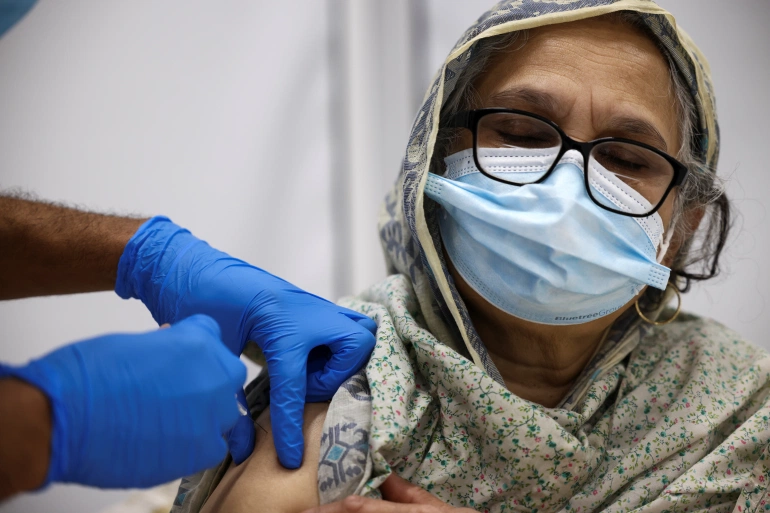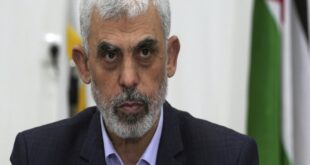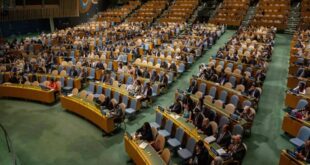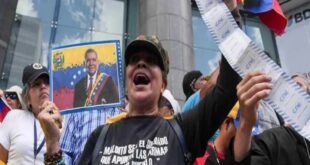
The global COVID-19 vaccine roll-out is creating a “vaccine apartheid”. As of February 24, approximately 216 million people have been vaccinated against COVID-19 globally. Only 8.4 percent of these are in low and lower-middle-income countries, which are home to nearly half of the world’s population.
If this trend continues, young and healthy individuals in wealthy countries will be vaccinated while older and vulnerable people in poorer countries continue to die, needlessly.
Wealthy countries have focused almost exclusively on securing vaccines for their own populations instead of investing in cooperative initiatives – such as the Access to COVID-19 Tools (ACT) (and its vaccine pillar COVAX) – that would fairly distribute vaccines to high-risk people in every country across the globe. In the process, they are hoarding limited supplies (with Canada, for example, securing nearly 10 doses per capita), raising vaccine prices, and squeezing lower-income countries out of the vaccination race. South Africa paid double what the European Union did for the AstraZeneca vaccine.
Most wealthy countries will fully vaccinate their population this year, while lower-income countries may not achieve mass immunisation until 2024. If this vaccine nationalism continues, the poorest in the world will be pushed into more disease, poverty and death.
Vaccine nationalism is also self-defeating. As wealthy countries roll out domestic vaccination plans, emerging COVID-19 variants threaten their success: recent data suggest that several vaccines currently in use may provide reduced efficacy against new variants.
As long as SARS-CoV-2 continues to circulate in poorer countries, wealthy countries are vulnerable, even with their vaccination shields. Their economies are also at risk. The International Chamber of Commerce predicts that if poorer countries are not given equitable access to vaccines, the global economy may lose as much as $9.2 trillion, approximately half of which would fall on advanced economies. By comparison, funding the ACT accelerator requires only $22.9bn.
Only a truly global vaccination strategy can ensure equal value is placed on the lives of the rich and the poor.
A global vaccination strategy is both cheaper and safer. It is also a moral imperative – only a truly global vaccination strategy can ensure equal value is placed on the lives of the rich and the poor.
Towards this end, we must take three urgent steps:
First, high-income countries should support transfers of relevant technologies and intellectual property (IP) to enable other countries to scale up vaccine production.
In 2020, South Africa and India submitted a proposal to the World Trade Organization (WTO) to temporarily waive certain provisions of the Trade-Related Aspects of Intellectual Property Rights Agreement (TRIPS) for COVID-19-related technologies.
The waiver was supported by nearly 100 countries, but was nonetheless spiked by the European Union, United States, United Kingdom, Japan and several other countries that host large pharmaceutical industries. Policymakers in wealthy countries argue that IP is not a true barrier to vaccine access and that existing TRIPS flexibilities are sufficient.
But IP has already become a barrier: South Africa faced challenges in accessing reagents for COVID-19 testing due to IP rules. What is more, the US, EU, and Switzerland have historically undermined the use of TRIPS flexibilities in order to protect pharma profits.
IP waivers and technology transfers will not lead to immediate inoculation in lower-income countries, but they will facilitate international collaboration and remove real barriers to local vaccine production. The TRIPS waiver will be reconsidered by the WTO in March, and wealthy countries should support it.
Second, high-income countries should deploy a proportion (eg 10 percent or more) of their vaccine supply for global allocation directly through COVAX (they currently hold about 56 percent of the world’s COVID-19 vaccine supply but make up only 16 percent of the global population).
Although sending doses abroad may delay their domestic vaccine roll-out, doing so will contribute to global herd immunity, which is in everyone’s interest. Norway committed to such a path last month. As wealthy nations begin to scale vaccine production, an incrementally larger fraction of their vaccines should be deployed to poorer countries.
Third, high-income countries should cover the entire $22.9bn funding gap of the ACT accelerator. This funding is necessary for COVAX to achieve its intended population coverage in the coming years. Some lower-income countries will utilise doses from COVAX as they secure purchases from vaccine manufacturers. Others may rely entirely on COVAX to achieve herd immunity.
COVAX is important, and it needs full support, but even at its most ambitious it will be too slow (it aims to vaccinate 20 percent of the population of lower-income countries by the end of the year), and it does not address the underlying structural problems that give rise to vaccine apartheid. We should not be distracted from the more important objective of establishing that all people have equal rights to public health medicines – not just for this crisis, but permanently. This is not a matter of charity, it is a matter of justice.
The COVID-19 pandemic will likely define how countries operate in global health for the coming decades. Vaccine apartheid is merely the latest manifestation of a colonial logic of othering and oppression that began centuries ago. Reparative justice demands undoing these legacies – and a commitment to vaccine equality can mark the start.

- Parsa Erfani Fogarty Scholar at Harvard and the University of Global Health Equity.
- Eugene Richardson Physician anthropologist and Assistant Professor of Global Health and Social Medicine at Harvard.Dr Eugene Richardson is a physician anthropologist and Assistant Professor of Global Health and Social Medicine at Harvard. His most recent book is “Epidemic Illusions: On the Coloniality of Global Public Health.”
- Jason Hickel Academic at the University of London and Fellow of the Royal Society of Arts.Dr Jason Hickel is an academic at the University of London and a Fellow of the Royal Society of Arts. His most recent book is « The Divide: A Brief Guide to Global Inequality and its Solutions, » published by Penguin in May 2017.




 World Opinions Débats De Société, Questions, Opinions et Tribunes.. La Voix Des Sans-Voix | Alternative Média
World Opinions Débats De Société, Questions, Opinions et Tribunes.. La Voix Des Sans-Voix | Alternative Média




